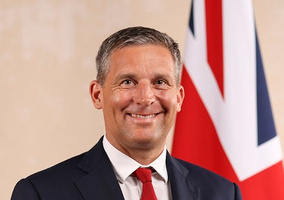Pia Sinha’s entry into the charity sector is fairly recent, having worked in the prison service for 24 years before becoming Prison Reform Trust (PRT) chief executive in April last year.
On joining the prison service as a psychologist in 1999, Sinha says she did not quite know what she was getting herself in for, but was “immediately really drawn” to the “fulfilling, very complex work”.
Sinha went on to work in several prisons, governed three, and in her last role was the director of women, where she was responsible for all the women’s prisons in the country.
“Then this opportunity came up to be the CEO of Prison Reform Trust,” she says. “It’s probably a job that I coveted for quite a while.”
She says it felt a natural step to take on the role after “feeling that I might need to be outside of that system to carry on with my ambition around prison reform”.
“I think it’s really important when you are heading up a reform charity, that you understand the operational functioning and operational reality of what your being critical of.
“In order to enact your reform agenda, to understand the levers that you need to push and pull, you need to have a relationship with the system as well, because we’re not just critical, we’re also there to be supportive and helpful and provide solutions and fresh ideas.
“And if you are someone who has been part of that system, your credibility then enhances as a result of your experience.”
Moving to the charity sector
The charity campaigns for a fair, just and humane prison system. It looks not only at who goes to prison and for how long, but also the conditions that people in prison face.
Sinha has found the transition into the charity sector “really hard” as it is a very different way of working.
“I think I may have underestimated the challenge, because you think that when you work in a highly complex environment like a prison, then anything else will be a bit of a breeze, but being a chief executive of a charity is very different.”
She says that in the prison service you have “layers and layers of bureaucracy” but as a charity CEO “the buck really stops at you”.
“I think that’s thing that you need to be prepared for, because the level of responsibility that you have is quite intense.
“It’s a very public role, it has a very high profile, and it’s challenging to have been inside a system for as long as I was, to then be outside of that system, requiring to be critical of it. And I think I found some of that quite challenging.”
Sinha says you have to navigate the change by relying on your colleagues.
Fundraising and public perception
Fundraising was new to Sinha as a charity CEO, with around 80% of PRT’s £2m annual income coming from trusts and foundations.
“There are not many funders that are involved in criminal justice and giving to criminal justice charities is quite a niche and specialist area. A lot of charities who operate in that space are competing with the same trusts and foundations, so it’s quite a competitive field.”
Encouraging donors to support a charity that’s a research and advocacy charity “is quite challenging as well”, she says, because a lot of donors want to give to organisations which are delivering a service.
Sinha says that PRT does not accept any funding from the government as a matter of principle.
“We feel that we have to speak our truth to power, and in order to do that, we have to be independent of the system. And it allows us the freedom to speak our truth. And so, it’s very important. It’s a key aim.
“People have quite different views on what we should be doing as a charity, and we’re very mindful of the fact that a lot of the quality of the intelligence that we get is based on the relationships that we have with people. And in order to do that, you need to be safe and you need to be trustworthy.”
Nonetheless, Sinha says her charity cannot “be activist to the point that people will then shut the doors on you” so a lot of how you manage that “requires a lot of diplomacy, a lot of pragmatism, and you need to pick the causes that you get behind”.
Evidence-based campaigning
Sinha says PRT is evidence-led, forthright and “politically astute” in its campaigning approach, which includes “providing valued research and briefing reports”.
“PRT are very, very careful in making sure that whatever we get behind, whatever we say, needs to be absolutely thoroughly researched.”
She says the charity has strong relationships across the charity sector, with ministers and parliamentarians, with officials within the prison system and with people who are in prison, recently out of prison, and their families.
“One of our key aims as a charity, is to look at why it is that Britain has the highest rate of imprisonment in western Europe, and what we need to do to address that, and right now, you have a prison crisis in terms of an overcrowding in capacity crisis.
“So, we support the government in their measures to alleviate this crisis, because that is after all, all they can do; you have to reduce the population in order to deliver decent regimes to the people who are in prison. But ultimately, there needs to be a serious conversation about who goes to prison and why.”
Concerning the recent rioting and resulting anti-racist protesting, Sinha says: “Even though you can never, ever condone what’s going on, there’s a part of you that needs to try and understand why it is that it’s got to this point.”
“Misinformation and populism and polarisation, all of those play a part, but a lot of those individuals are somehow feeling apart from society.
“We need to do is to have these debates about why it is that people are behaving the way that they are – whether it’s rioting, whether it’s about drug use, whether it’s about alcoholism, whether it’s about violence.”
Sinha says part of being a psychologist means she has spent much of her career trying to understand the reasons individuals come into prison.
“They are people who have been blighted by poverty. They’re people who have been blighted by poor mental health, there’s people who because of their life experiences, have drifted into drug use and alcoholism, and prison becomes their sort of last chance saloon.
“We’re very quick to punish because it means it takes those individuals away from society puts them in prison. If you want as individuals to become good citizens, which is what we should be aiming for, we need to be investing upstream in the kinds of things that help them through those issues and those problems in the first place.”
Sinha says it is hard to get people to feel empathic for people who are in prison currently “because there is such a strong narrative around being tough on crime”.
“If you talk about poor conditions in prisons, not many people feel that it’s something that we should address as a priority, because their standard line is ‘well you’ve committed crime, so you shouldn’t be expecting to have good conditions in prison’.
“But the compelling argument, I think, for now, which I think people will pay attention to, is that it’s actually a really cost-ineffective strategy.
“It costs £50,000 per year to put a person through prison, and if they come out of that other end, unrehabilitated, and commit more crime and part of a revolving door, then that’s a waste, and what we need to be doing is looking at what are the underlying issues behind why someone commits crime.”
Former chair becomes minister
PRT’s former chair and retail boss James Timpson recently stepped down from the charity to take up a ministerial role in Keir Starmer’s government, as prisons minister.
Sinha says the whole prisons sector “feels very optimistic about the appointment” as sometimes people take on the portfolio with very little knowledge of the sector.
“But with James, you have someone who knows the system, who cares about prison and prisoners and their families. I think that can only be a good thing.”
She adds: “It’s probably a good thing that he isn’t a voted politician – it might give him greater freedom, but it’s to be seen.
“James is someone who’s really oriented by action, so let’s hope that he is given the access to do that.”
Related Articles












